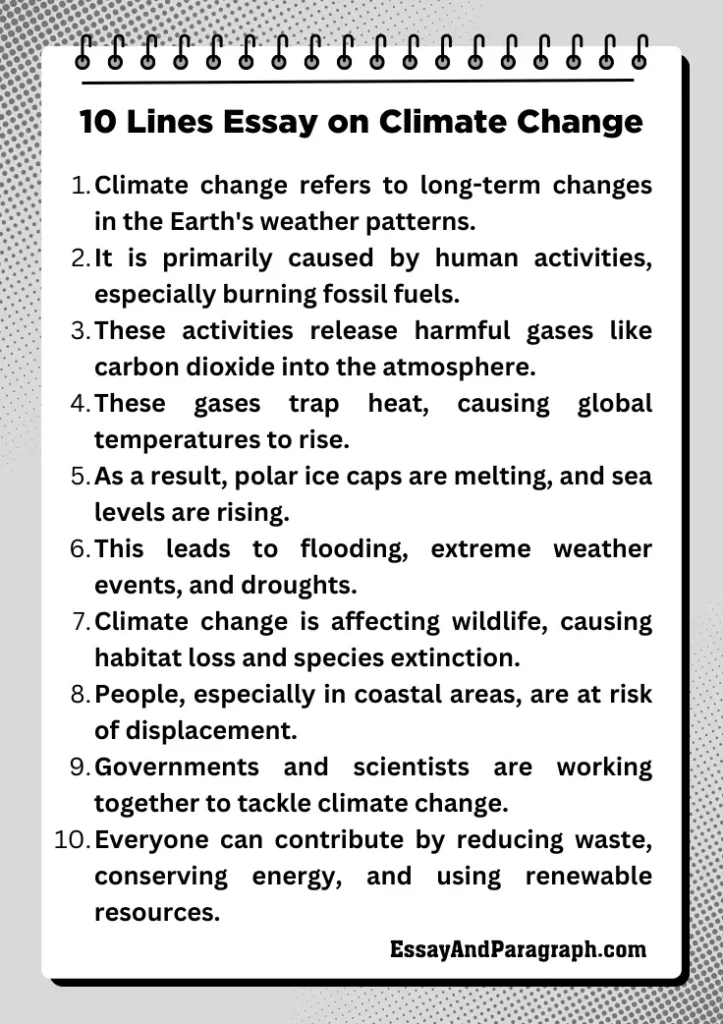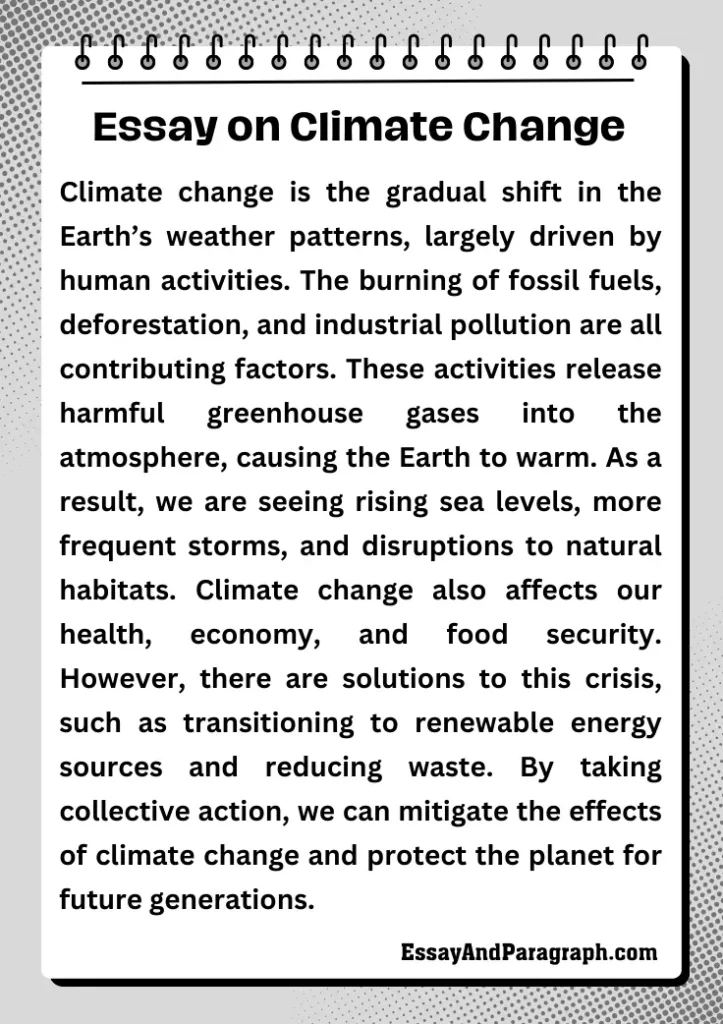Have you ever wondered why the weather seems so different from what you remember? Maybe it’s a bit warmer or colder, or there’s more rain than usual. This change in the climate is what we call “climate change.” It’s the long-term shift in weather patterns caused by human activities like burning fossil fuels, deforestation, and industrial pollution. Climate change affects every part of our world – from the air we breathe to the plants and animals around us. In this article, we will learn how to write an essay on climate change and explore its effects on the planet.
10 Lines Essay on Climate Change
Climate change refers to long-term changes in the Earth’s weather patterns.
It is primarily caused by human activities, especially burning fossil fuels.
These activities release harmful gases like carbon dioxide into the atmosphere.
These gases trap heat, causing global temperatures to rise.
As a result, polar ice caps are melting, and sea levels are rising.
This leads to flooding, extreme weather events, and droughts.
Climate change is affecting wildlife, causing habitat loss and species extinction.
People, especially in coastal areas, are at risk of displacement.
Governments and scientists are working together to tackle climate change.
Everyone can contribute by reducing waste, conserving energy, and using renewable resources.

Essay on Climate Change – 100 words
Climate change is a long-term change in Earth’s weather patterns, largely caused by human actions such as burning fossil fuels, deforestation, and industrial pollution. These activities release greenhouse gases, like carbon dioxide, into the atmosphere, which trap heat and warm the planet. The effects of climate change include rising sea levels, more frequent storms, and shifts in weather patterns. It disrupts ecosystems, endangers wildlife, and threatens human communities. To combat climate change, it is essential to reduce emissions, protect forests, and adopt sustainable energy sources. Everyone can play a part in minimizing the impact of climate change.
Essay on Climate Change – 200 words
Climate change refers to the long-term change in Earth’s weather patterns, driven mainly by human activities such as burning fossil fuels, deforestation, and industrial activities. The burning of coal, oil, and gas releases harmful greenhouse gases, like carbon dioxide and methane, into the atmosphere. These gases trap heat and cause the planet’s average temperature to rise, leading to the warming of Earth, known as global warming.
This change in temperature causes glaciers and ice caps to melt, leading to rising sea levels and coastal flooding. Additionally, we are experiencing more extreme weather events, such as heatwaves, droughts, and severe storms. Climate change also disrupts ecosystems, with species facing extinction due to habitat loss.
To prevent further damage, it is crucial to reduce greenhouse gas emissions by transitioning to renewable energy sources like wind and solar power. Reducing waste, protecting forests, and adopting sustainable practices in agriculture and industry will also help mitigate climate change. Governments and individuals must take collective action to protect the planet. Everyone, from citizens to corporations, has a role in addressing this global challenge.
Short Essay on Climate Change – 250 words
Climate change is one of the most significant challenges facing the world today. It refers to long-term changes in weather patterns, particularly the rise in global temperatures. This phenomenon is largely driven by human activities, such as the burning of fossil fuels, deforestation, and industrial pollution. The combustion of fossil fuels releases greenhouse gases, like carbon dioxide, which trap heat in the atmosphere and cause the planet to warm.
The impact of climate change is already being felt worldwide. Rising temperatures are causing glaciers and ice caps to melt, contributing to rising sea levels. This threatens coastal areas, where millions of people live. Extreme weather events, including hurricanes, heatwaves, and floods, are becoming more frequent and severe, disrupting communities and economies.
The effects of climate change also extend to ecosystems and biodiversity. As temperatures rise and weather patterns shift, many species are struggling to adapt, leading to habitat loss and extinction. Agriculture is also affected, as unpredictable weather can damage crops and reduce food supply.
To combat climate change, both governments and individuals must take action. Governments should invest in renewable energy sources, enforce regulations on emissions, and promote sustainable agriculture. On a personal level, individuals can reduce their carbon footprint by using less energy, driving less, and supporting eco-friendly products. Tackling climate change requires a collective effort to ensure a sustainable future for the next generations.
Long Essay on Climate Change – 500 words
Climate change is one of the most pressing environmental issues of our time, and its effects are already being felt across the globe. Climate change refers to the long-term change in weather patterns, such as increased global temperatures, changing rainfall patterns, and rising sea levels. While natural factors have historically influenced the Earth’s climate, human activities have significantly accelerated these changes. The primary cause of climate change is the release of greenhouse gases, such as carbon dioxide (CO2), into the atmosphere. These gases trap heat, leading to the warming of the planet.
The burning of fossil fuels like coal, oil, and natural gas for energy, transportation, and industrial production is the primary contributor to greenhouse gas emissions. Deforestation, agriculture, and waste also contribute to these emissions. As the concentration of greenhouse gases in the atmosphere increases, more heat is trapped, and global temperatures rise. This process is commonly referred to as global warming, and it is the primary driver of climate change.
One of the most visible effects of climate change is the melting of polar ice caps and glaciers, which leads to rising sea levels. In many coastal regions, this threatens to displace entire communities and disrupt ecosystems. Rising sea levels can also lead to flooding of vital infrastructure, including roads, homes, and agricultural land. Additionally, extreme weather events such as hurricanes, heatwaves, and floods have become more frequent and intense, affecting millions of people worldwide.
Climate change is not just an environmental issue; it has significant social and economic consequences. The effects of climate change disproportionately affect vulnerable populations, such as low-income communities and people living in developing countries. Rising temperatures and changing weather patterns threaten food production, especially in regions that rely on agriculture. Extreme weather events also cause economic losses, as infrastructure, homes, and businesses are damaged or destroyed.
The impact on biodiversity is another major concern. As temperatures rise, many species are unable to adapt to the changing conditions. This leads to the loss of habitats and the extinction of various plants and animals. In some cases, entire ecosystems are at risk of collapse, such as coral reefs, which are sensitive to temperature changes and ocean acidification.
To combat climate change, both global and local action is necessary. Governments must play a leading role by adopting policies that limit greenhouse gas emissions. The Paris Agreement, signed by nearly every nation, aims to limit global temperature rise to well below 2°C above pre-industrial levels. This requires transitioning to renewable energy sources, such as wind, solar, and geothermal power, while reducing reliance on fossil fuels. In addition, efforts to reduce deforestation, promote sustainable agriculture, and invest in carbon capture technologies are crucial.
Individuals can also make a difference by adopting sustainable practices. This includes using less energy, driving less, reducing waste, and supporting environmentally friendly products. By making these changes, we can collectively reduce our carbon footprint and slow the pace of climate change.
In conclusion, climate change is a global challenge that requires urgent action. Its impacts are already being felt across the world, and the need for effective solutions has never been greater. By working together, we can mitigate the effects of climate change and create a more sustainable and resilient future for the planet. Everyone has a role to play in this effort, and the time to act is now.
FAQs
1. What causes climate change?
Climate change is primarily caused by human activities, especially the burning of fossil fuels like coal, oil, and natural gas. These activities release carbon dioxide (CO2) and other greenhouse gases into the atmosphere. These gases trap heat, warming the planet and leading to changes in the climate. Deforestation and industrial activities also contribute to the problem.
2. How does climate change affect animals and plants?
Climate change has a significant impact on animals and plants. As temperatures rise, many species face the risk of extinction as their habitats become uninhabitable. For example, warmer waters harm coral reefs, while changing rainfall patterns threaten the survival of plants and animals in certain regions. Climate change can also cause food and water shortages, which affect the survival of species.
3. How can we stop climate change?
We can reduce climate change by cutting down on greenhouse gas emissions. This can be achieved by using renewable energy sources like solar and wind power, improving energy efficiency, and reducing waste. Protecting forests and adopting sustainable farming practices are also important steps. Governments, industries, and individuals all play a role in addressing this global issue.
4. Why is climate change dangerous?
Climate change is dangerous because it leads to extreme weather events, rising sea levels, and disruptions to ecosystems. These changes can cause flooding, droughts, and heatwaves, which threaten food and water supplies, damage infrastructure, and increase the risk of diseases. The economic and social costs of climate change are also high, affecting millions of people around the world.
5. What are some solutions to climate change?
Some solutions to climate change include transitioning to renewable energy sources, reducing carbon emissions, protecting forests, and improving waste management. Governments and industries must work together to implement policies that reduce the carbon footprint. Individuals can also make a difference by reducing their energy use, driving less, and supporting sustainable practices.
Top 5 Quotes on Climate Change
“The Earth is what we all have in common.” – Wendell Berry
“Climate change is real. It is happening now.” – Barack Obama
“We do not inherit the Earth from our ancestors, we borrow it from our children.” – Native American Proverb
“The greatest threat to our planet is the belief that someone else will save it.” – Robert Swan
“What we are doing to the forests of the world is but a mirror reflection of what we are doing to ourselves and to our fellow man.” – Mahatma Gandhi
Summary on Climate Change
Climate change is the gradual shift in the Earth’s weather patterns, largely driven by human activities. The burning of fossil fuels, deforestation, and industrial pollution are all contributing factors. These activities release harmful greenhouse gases into the atmosphere, causing the Earth to warm. As a result, we are seeing rising sea levels, more frequent storms, and disruptions to natural habitats. Climate change also affects our health, economy, and food security. However, there are solutions to this crisis, such as transitioning to renewable energy sources and reducing waste. By taking collective action, we can mitigate the effects of climate change and protect the planet for future generations.




